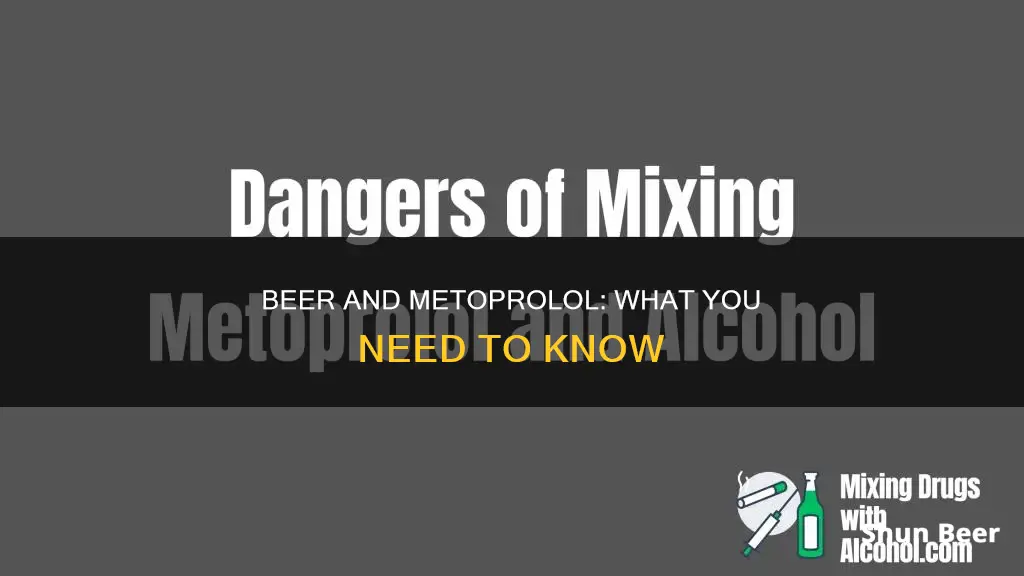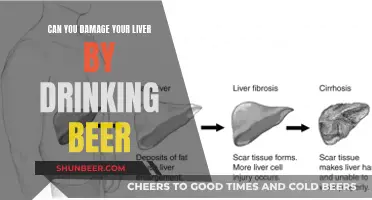
Mixing alcohol and beta-blockers can have unpleasant and sometimes dangerous side effects. Beta-blockers are a blood pressure medication predominantly prescribed to people with high blood pressure. Alcohol can cause an individual's blood pressure to spike and then drop. Therefore, drinking regularly can make it difficult for the body to regulate blood pressure, which can disrupt how beta-blockers work in the body. Metoprolol is a beta-blocker, and drinking alcohol with it can cause additive effects in lowering your blood pressure. This can lead to hypotension, a condition where your blood pressure drops to a dangerously low level.
| Characteristics | Values |
|---|---|
| Can I drink beer with metoprolol? | Drinking alcohol while taking metoprolol is generally not recommended by doctors. |
| What are the effects of drinking alcohol while taking metoprolol? | Drinking alcohol while taking metoprolol can cause an increase in side effects such as dizziness, lightheadedness, nausea, inability to concentrate, and even fainting. Both substances can have a depressant effect on the central nervous system, increasing the risk of these side effects when used together. |
| What are the risks of drinking alcohol while taking metoprolol? | The combination of alcohol and metoprolol can lead to hypotension, a dangerous drop in blood pressure that can cause dizziness, fainting, and other serious health complications. Alcohol can also interfere with the mechanism of action of metoprolol, potentially diminishing its effectiveness in controlling blood pressure and reducing cardiovascular risk. |
| What should I do if I want to drink alcohol while taking metoprolol? | Consult with a healthcare provider before making any decisions regarding alcohol consumption while taking metoprolol. Timing alcohol consumption away from taking the medication can help minimize immediate interactions and potential side effects. If drinking, it is advisable to consume alcohol in moderation and well before or after taking metoprolol. |
What You'll Learn

The effects of drinking alcohol with metoprolol
Metoprolol is a beta-blocker medication that works by blocking beta receptors in the heart and blood vessels. This slows the heart rate and reduces blood pressure, making it useful for treating cardiovascular conditions such as high blood pressure, angina (chest pain), and certain heart rhythm disorders.
When considering drinking alcohol while taking metoprolol, it is important to understand the potential interactions and side effects. Alcohol can influence how metoprolol is metabolized and impact its effectiveness. Here are some of the effects of drinking alcohol while taking metoprolol:
- Increased side effects: Drinking alcohol while taking metoprolol can lead to an increase in side effects such as dizziness, lightheadedness, and fainting. Both substances can have a depressant effect on the central nervous system, enhancing these side effects.
- Drop in blood pressure: Alcohol can enhance the blood pressure-lowering effect of metoprolol, leading to a condition called orthostatic hypotension. This is characterized by a drop in blood pressure when standing up from a seated or lying position, resulting in dizziness or fainting.
- Interference with medication mechanism: Long-term heavy alcohol consumption may reduce the effectiveness of metoprolol in controlling blood pressure and reducing cardiovascular risks. Alcohol can interfere with the mechanism of action of beta-blockers, potentially diminishing their desired effects.
- Negative impact on cardiovascular health: Cardiologists generally advise against excessive alcohol consumption for individuals with cardiovascular diseases. Alcohol can interfere with the benefits of metoprolol, reducing its positive impact on the heart and blood pressure.
- Increased risk of side effects with extended-release metoprolol: The extended-release form of metoprolol, when taken with alcohol, can lead to faster release of the drug in the body, increasing the risk of side effects.
- Difficulty in monitoring blood pressure: As alcohol can cause fluctuations in blood pressure, it can be challenging to monitor the effectiveness of blood pressure medications like metoprolol.
It is important to note that the effects of drinking alcohol while taking metoprolol can vary depending on medical history, age, and other medications being taken. Therefore, it is always advisable to consult a healthcare provider before making any decisions regarding alcohol consumption while taking this medication.
Beer and Straws: A Refreshing Combination?
You may want to see also

The safety of drinking alcohol with metoprolol
Metoprolol is a beta-blocker medication that is used to treat cardiovascular conditions such as high blood pressure, angina (chest pain), and certain heart rhythm disorders. It works by blocking the effects of adrenaline on the heart, resulting in a slower heart rate and reduced blood pressure.
Alcohol, on the other hand, is a central nervous system depressant that can have both stimulant and depressant effects on the body. When consumed, alcohol is rapidly absorbed into the bloodstream and can affect various systems in the body. Initially, it may lead to feelings of relaxation and euphoria. However, as blood alcohol concentration rises, it can impair motor skills, coordination, and judgment.
When it comes to the safety of drinking alcohol while taking metoprolol, there are several important considerations to keep in mind. Firstly, both alcohol and metoprolol can lower blood pressure. This means that drinking alcohol while taking metoprolol may cause an additive effect, leading to a dangerous drop in blood pressure known as hypotension. This can result in symptoms such as dizziness, lightheadedness, fainting, and changes in pulse or heart rate. Therefore, it is generally recommended that individuals taking metoprolol avoid alcohol consumption to prevent these potentially harmful side effects.
Additionally, alcohol can interfere with the mechanism of action of beta-blockers like metoprolol, reducing their effectiveness. It can also increase the risk of certain side effects, especially when taken with the extended-release form of metoprolol. In a study, researchers found that the presence of alcohol caused the drug to be released into the body faster, increasing the risk of adverse effects.
The effects of mixing alcohol and metoprolol can also depend on the amount of alcohol consumed, the specific beta-blocker being taken, and the individual's medical condition. For example, those with a history of alcohol use disorder or binge drinking should consult a doctor before taking metoprolol, as alcohol intake may impact heart health.
Furthermore, it is important to note that abruptly stopping metoprolol or adjusting the dosage without medical supervision can lead to adverse effects and potentially worsen the underlying condition. Therefore, individuals should always consult a healthcare provider before making any changes to their medication or alcohol consumption.
In summary, while a single drink of alcohol with metoprolol may not cause serious side effects, especially in individuals who tolerate metoprolol well, it is generally recommended to avoid alcohol consumption while taking this medication. The combination of alcohol and metoprolol can lead to increased side effects and compromise the effectiveness of the drug in controlling blood pressure and reducing cardiovascular risk. Individuals should always consult a healthcare provider to discuss the potential risks and determine if any adjustments to medication or lifestyle are necessary.
Drinking Beer and Driving: Is It Safe?
You may want to see also

The side effects of drinking alcohol with metoprolol
Mixing alcohol and metoprolol can cause unpleasant and sometimes dangerous side effects. Metoprolol is a beta-blocker that lowers blood pressure and slows the heart rate. Alcohol also lowers blood pressure. When combined, there is a risk that blood pressure can fall to a dangerously low level, a condition called hypotension.
Side effects of drinking alcohol with metoprolol
- Dizziness
- Lightheadedness
- Fainting
- Headache
- Changes in pulse or heart rate
- Nausea
- Inability to concentrate
These side effects are most likely to be seen at the beginning of treatment, following a dose increase, or when treatment is restarted after an interruption.
In addition, alcohol can have negative effects on the conditions that metoprolol is used to treat, such as:
- Heart conditions: Excessive drinking can lead to cardiomyopathy or an irregular heart rate.
- Migraine: Alcohol can trigger migraine attacks.
- Tremors: While small amounts of alcohol can help essential tremors, severe tremors are common in alcohol withdrawal.
- Anxiety: Alcohol can cause or worsen anxiety.
- Glaucoma: Alcohol can increase pressure in the eye, worsening glaucoma.
It is important to consult a doctor before consuming alcohol while taking metoprolol.
Energy and Alcohol: Do Beer and Red Bull Work?
You may want to see also

The influence of alcohol on the effectiveness of metoprolol
Metoprolol is a beta-blocker medication that is used to treat cardiovascular conditions such as high blood pressure, angina (chest pain), and certain heart rhythm disorders. It works by blocking the effects of adrenaline on the heart, resulting in a slower heart rate and reduced blood pressure. Beta-blockers are typically prescribed to individuals with hypertension, or high blood pressure.
Alcohol can have a significant impact on the effectiveness of metoprolol and other beta-blockers. When consumed in excess, alcohol can lower blood pressure and cause fluctuations, making it difficult for the body to regulate blood pressure effectively. This can be especially dangerous for individuals taking beta-blockers, as the combination of the two can lead to a dangerous drop in blood pressure known as hypotension.
The consumption of alcohol while taking metoprolol can also increase the risk of certain side effects, including dizziness, lightheadedness, fainting, and changes in pulse or heart rate. These side effects may be more likely to occur at the beginning of treatment, following a dose increase, or when treatment is restarted after an interruption. It is important for individuals taking metoprolol to be cautious when getting up from a sitting or lying position, as orthostatic hypotension may occur.
In addition to the immediate interactions and side effects, long-term heavy alcohol consumption may also limit the effectiveness of metoprolol in controlling blood pressure and reducing the risk of cardiovascular events. Alcohol can interfere with the mechanism of action of beta-blockers, potentially diminishing their desired effects. Excessive alcohol intake can also contribute to high blood pressure, which is counterproductive to the goal of metoprolol therapy.
Therefore, it is generally recommended that individuals taking metoprolol avoid alcohol consumption or drink in moderation. It is important to consult with a healthcare provider to determine the level of alcohol intake that is appropriate for an individual's specific circumstances. Timing alcohol consumption away from taking the medication can also help minimize any immediate interactions and potential side effects.
DayQuil and Beer: A Safe Mix?
You may want to see also

Medical advice on drinking alcohol with metoprolol
Drinking alcohol while taking metoprolol is generally not recommended by doctors. Metoprolol is a beta-blocker, a class of drugs that lower blood pressure by slowing the heart rate and reducing the force of each beat. Alcohol can also lower blood pressure, so when combined with metoprolol, there is a risk of hypotension, or dangerously low blood pressure. This can cause dizziness, nausea, fainting, and an inability to concentrate.
The combination of alcohol and metoprolol can also increase the risk of side effects such as headache, dizziness, lightheadedness, fainting, and changes in pulse or heart rate. These side effects are most likely to occur at the beginning of treatment, following a dose increase, or when treatment is restarted after an interruption. It is important to consult a doctor if these symptoms do not go away after a few days or become troublesome.
In addition, alcohol can have negative effects on the conditions that metoprolol is used to treat, such as heart conditions, migraine, tremors, anxiety, and glaucoma. For example, excessive drinking can lead to cardiomyopathy or irregular heart rate, and alcohol can trigger migraine attacks and increase eye pressure in people with glaucoma.
While a glass or two of red wine in moderation is relatively safe when taking beta-blockers, excessive alcohol consumption can have detrimental effects on the body, including liver disease, cirrhosis, and an increased risk of certain cancers. It can also lead to high blood pressure and weight gain over time, which can reduce the effectiveness of metoprolol in controlling blood pressure and reducing cardiovascular risk.
Therefore, it is advisable to exercise caution and moderation when consuming alcohol while taking metoprolol. Any decisions regarding alcohol consumption should be made in consultation with a healthcare provider, who can help weigh the risks and benefits and explore alternative options. It is also important to follow the prescribed dosage and timing guidelines for metoprolol to ensure the medication's effectiveness and minimize potential risks.
Beer and Pre-Workout: A Safe Combo?
You may want to see also
Frequently asked questions
It is not recommended to drink alcohol while taking metoprolol, as it may cause an increase in side effects such as dizziness, lightheadedness, and fainting. Both substances can have a depressant effect on the central nervous system, increasing the risk of these side effects when used together.
The combination of metoprolol and alcohol may cause additive effects in lowering your blood pressure, leading to symptoms such as headache, dizziness, lightheadedness, fainting, and changes in pulse or heart rate.
Alcohol can interfere with the benefits of metoprolol, potentially reducing its effectiveness in controlling blood pressure and lowering the risk of cardiovascular events. It is important to consult with a healthcare provider to determine if alcohol consumption is safe for your specific circumstances.
It is recommended to consult with a healthcare provider before drinking alcohol while taking metoprolol. Generally, it is advised to wait at least 2-3 days after starting the medication or changing the dosage to see how it affects your body before consuming alcohol.
Drinking alcohol while taking metoprolol can lead to unpleasant and potentially dangerous side effects. It can also be challenging to monitor the efficacy of blood pressure medication when alcohol is consumed, as it can cause fluctuations in blood pressure.







